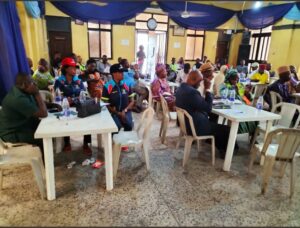On July 28, 2022, Spaces for Change | S4C hosted property owners and land developers in Ebute-Metta to a one-day legal clinic aimed at upturning the tide of distressed buildings in Lagos State. The 80 participants at the clinic comprised representatives from the Lagos State Landlords and Developers Association, leaders of Community Development Associations (CDAs), Lagos State Building Control Agency (LASBCA), and the Lagos State Physical Planning Permit Authority (LASPPPA). The clinic harped on enhancing compliance with urban planning laws and regulations as a panacea to distressed building collapse in Lagos State. Ebute-Metta has a notoriety for building collapses, hence, the selection of the area for the legal clinic.
A significant number of Lagos State residents live in densely-populated informal settlements and poorly-constructed houses. Compounded by the housing deficits in Lagos which currently towers above 3 million housing units, this situation fuels the resistance by landlords to give up distressed buildings marked for demolition by state regulators. According to a report, 12% of building collapses in Lagos State are due to the negligent management of distressed buildings. In May 2022 alone, LASBCA marked not less than 10 buildings for demolition because of structural defects and unsafe habitation.
S4C’s Legal Officer, Patrick Allam, described the clinic as a knowledge-building effort by Spaces for Change to stem the tide of building collapse in Lagos State. The clinic places emphasis on knowledge-building because knowledge of the urban planning laws of Lagos State is the first step towards compliance. Technical sessions on building codes and planning standards were delivered in the Yoruba language by the representatives of LABSCA and LASPPPA. They corrected the popular misconception that only old dilapidated buildings are usually marked as distressed buildings. From a regulatory viewpoint, any building constructed in a way adverse to the inhabitants and/or adjoining structures is designated “distressed”. Not only that, unregulated renovations on buildings are prima facie presumptions of distressed buildings and will be accordingly marked and demolished by relevant agencies. Beyond gaining knowledge of the relevant urban planning laws and building regulations, the clinic also afforded a no-holds-barred platform for a parley between property owners and government regulators to discuss the difficulties associated with policy implementation and compliance.
Proffering solutions, the facilitators outlined procedures in the Lagos State Urban and Regional Planning Regulation 2015 where property owners are allowed to initiate procedures to remedy distressed buildings. The advantage of salvaging such defects in buildings includes assuring the personal safety of occupants and retaining ownership of the property as a panacea to section 74 of the Lagos State Urban and Regional Planning Development Law 2010 which empowers LASBCA to demolish distressed buildings and the forfeiture of such properties to the Lagos State Government.
As expected, passionate reactions followed the technical presentations. There were deep concerns about the lax enforcement of building regulations, the inconsistent application of the law by the agencies, and the cumbersome processes associated with renovating a distressed building. These topped the list of reasons for the vast non-compliance by property owners. There were also suggestions for periodic probes of all building developments within the state to ensure developers and property owners adhere to physical planning and building control laws and regulations. More still, the agency’s sensitization techniques in bridging the knowledge gap were also faulted.
Responding to the reactions, the lack of manpower to effectively probe all building development within the state remains a clog in the wheel of regulatory enforcement. Most recently, a partnership being forged between the Lagos Neighborhood Safety Corps (LSNC) and the Community Development Committee (CDC) is underway to bridge the manpower gap. The CDC and LSNC officials will jointly serve as watchdogs and report all forms of unethical practice by developers. Also, the whistleblowing policy by the Ministry of Physical Planning and Urban Development allows CDAs and individuals to report distressed buildings and unwholesome practices in their respective communities. Property owners thanked S4C for organizing the clinic, and committed to enhancing complaince to ensure safe and habitable buildings in Lagos State.





















